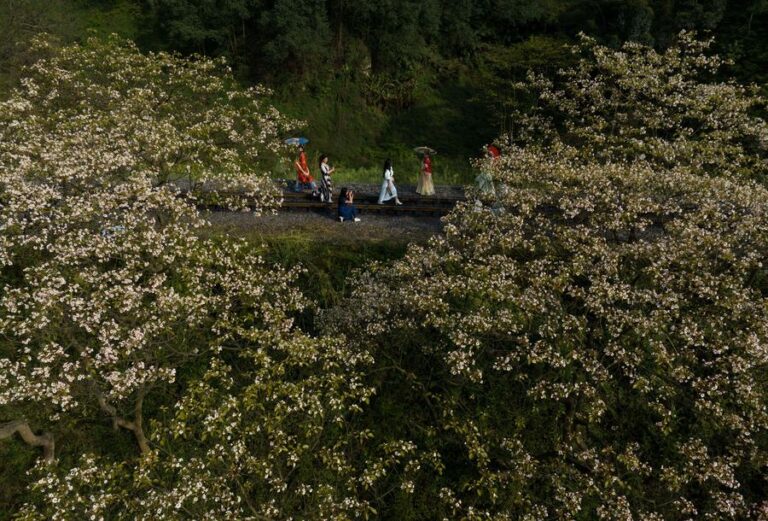This aerial photo taken on April 9, 2023 shows tourists having fun around Liangshuituo Station in Jianwei County, Leshan City, southwestern Sichuan Province, China. (Xinhua/Jiang Hongjing)
CHENGDU, May 18 (Xinhua) – About an hour’s drive from the main venue of the International Horticultural Expo 2024, villages in Leshan City, Sichuan Province, Chengdu, are benefiting from a flourishing horticulture industry to adorn the daily lives of their residents. Is receiving. Revitalize the local economy through ecotourism.
The rose garden in Jiang’anhua Village, Mianzhu Town, Leshan City has attracted approximately 180,000 visitors since its completion in April 2022.
“The daily maintenance, management, and support services of the rose garden have not only provided employment opportunities for the surrounding residents and increased their total income by more than 200,000 yuan (approximately US$28,170), but also reduced the amount of degraded land. “We have transformed it into an attractive site. It is a famous site on the Internet,” said Chen Xiaoying, the garden’s manager.
Chen also plans to build the rose garden as a research and learning hub for nearby schools, where students can learn directly from Mother Nature through fruit picking and other activities without relying on textbooks.
In the rose garden, workers can be seen busy under the sun watering, weeding, and fertilizing the rose garden.
“I’m happy to see so many visitors flocking to the Rose Garden every day since it opened. When you’re my age, it’s not easy to find a job you really like close to home. No,” Tong Gilan said. , a 47-year-old villager living in the nearby Mianzhupu community.
Mr. Tong earns 120 yuan a day working in the garden. “Currently, more than 20 villagers in our village are doing work right in front of me, just like me,” she added.
In 2023, the annual per capita income of Tong community residents reached 43,200 yuan, an increase of 200% compared to 2016.
In Guanyin Village, another village in Leshan, local farmers are fertilizing and weeding jasmine fields in preparation for the jasmine harvest later this month.
Liu Zhengtian, a local farmer from Guanyin Village, Qingxixiang, said, “The local government led us to develop jasmine cultivation and strongly supported us in stabilizing flower prices, guiding the market, and improving industrial technology.” “He gave me a lot of help,” he said. Last year, Liu planted more than 6 mu (about 0.4 hectares) of jasmine flowers.
Currently, there are more than 4,000 mu of jasmine in Guanyin Village, and more than 25,000 mu of jasmine in Qingxi Township. Qingxi jasmine cultivation area currently ranks first in southwestern China, with annual production value of jasmine tea exceeding 224 million yuan.
Leshan City strives to develop the floriculture industry, from simple planting to the close integration of primary, secondary and tertiary industries, and takes the local natural landscape as the main industrial field. , making it a cash cow for farmers.
In late April, the 2024 International Horticultural Expo Chengdu opened in Chengdu, the capital of Sichuan province. The exposition’s flourishing gardens will be on display from April 26th until his October 28th.
“With the help of the expo, we hope to further promote the cultural tourism project in conjunction with Leshan’s popular tourist attractions and attract more visitors and buyers,” Mianzhupu community neighborhood said Zhu Wenhui, head of the committee.
“We also want more urban residents in Chengdu to travel to the countryside on weekends, make our village a ‘backyard garden’, and feel the great changes in the rural area and its culture. “I think so,” Zhu added. ■

